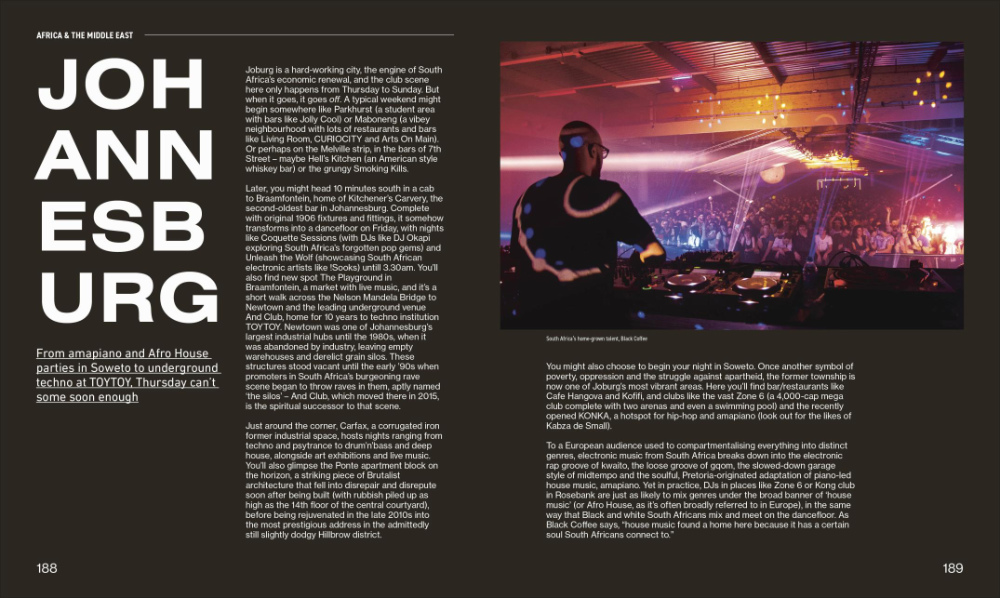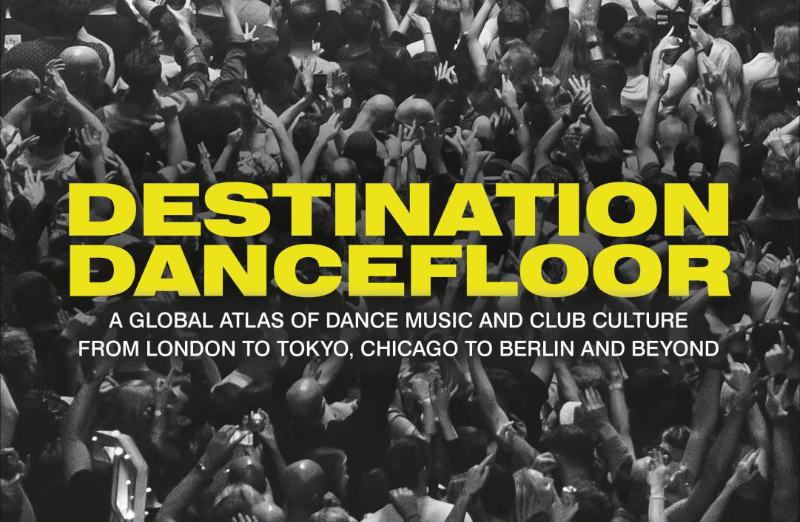As a resident raving reporter with Mixmag for almost two decades, there aren’t many corners of global club culture that Duncan Dick isn’t familiar with. Destination Dancefloor is the end product of this globe-trotting hedonistic experience.
An encyclopaedia of local scenes, clubs and DJs around the world, the book is your new global passport to electronic music’s escapist club spaces around the world.
Rob Smith chatted to Duncan about the process of writing the book, what to expect and how you assemble a database on the cities and scenes leading electronic music forward worldwide.
Others in club culture publishing have suggested that we’ve hit a post-lockdown club culture writing renaissance, do you agree? Why has Destination Dancefloor arrived now?
I know for a fact that there were a lot of great club culture writers who suddenly found themselves with a lot more time on their hands during lockdown, that’s for sure. It’s incredible what you can do at the weekends when you don’t spend the daylight hours shivering dehydrated under your duvet!
I think the time and boredom engendered over lockdown saw a lot of interesting creative projects either started up or taken off the shelf after everyone had tired of clapping out of windows and Tiger King and all those other strange shared cultural phenomena at the time.
One of the few positives for club culture to come out of all the recent unpleasantness, was the opportunity for introspection. The space and distance encouraged us to think beyond the immediate hedonism and really reckon with what makes going out so special and how much we loved, missed and treasured it.
Destination Dancefloor came out of a conversation between the publishers DK and Mixmag’s Nick Stevenson about a collaboration. During my time as editor at Mixmag, I had been advocating for the magazine to ‘do a spin-off book’ for years. Thankfully when I was asked to come on board, among my many scribbled ideas were some that aligned with what they had in mind.
Is Destination Dancefloor a product of your personal clubbing experiences across the world with Mixmag, or have you been interviewing key figures and travelling to locations across the globe to do research for the title?
The book is a snapshot of the club scene in 50 cities around the world at the time it was written, with 25 of them accompanied by essays on particular historical contributions to the culture as a whole; the Love Parade, Frankie Knuckles, Goa trance, the Electrifying Mojo, the fight to save Fabric etc. So there were really two parts to the writing.
Having been hugely fortunate to visit over 40 countries with Mixmag to write about clubs, festivals and DJs, I did have a passing familiarity with most of them, as well as handily knowing how to ask for more drinks tokens and late checkouts in various languages. But at the time it was written there was a state of flux post-lockdown, with some cities at different stages of reopening.
Travel wasn’t always an option for budget and restriction reasons. But something even better than touring the planet at Mixmag was the opportunity I’d had there to build up a network of incredibly knowledgeable, passionate and generous people all over the world.
In every city I was able to connect with committed club journalists or photographers or editors based there, sometimes directly with people I knew, sometimes through Mixmag’s franchises and outposts all around the world. A lot of people gave up a lot of time answering my increasingly obscure questions about their cities (“but what is the vibe like in the queue? ‘what does the basement room smell like” etc.).
For a few cities, where there was a language barrier or if there was someone out there just too expert not to bring fully on board (someone like Holly Dicker, the authority on both hardcore and Rotterdam), I commissioned and paid them from my fee to co-write a city chapter with me, though I take all responsibility for any errors or omissions in the final edit.
I also did all kinds of strange things to enhance my own feel for the cities I hadn’t visited in person, from watching a four hour YouTube video walk around Montevideo to visiting a Ugandan restaurant to taste Kampala-style street food.
The essays were a great opportunity to go through the Mixmag archives and my own introspection about club culture and really think about the moments or people or clubs that have shaped the global scene.
You’ve previously been involved in club culture publishing as part of The Secret DJ Team, how did you find putting your own book together from scratch, and working with an iconic publishing house like DK?
I just treated it like putting together a big heavy magazine, to be honest. One page at a time. Connecting with amazing people around the world was a joy, the small amount of transcribing a chore, selecting, researching and writing the essays was incredibly satisfying, and delivering chunks of pages – especially that final chunk – is one of the best feelings currently available to a human being.
Whoever you selected to write the foreword for a book about global dance culture would have had to be one of the biggest names in electronic music, why did you choose Carl to write it?
Carl Cox is the ultimate bridge between commercial success and an uncompromising, uncomplicated love for great music, great clubs and the whole culture. He is an immortal, there from the start of acid house in the UK and still there in Ibiza every summer. He personifies what the book celebrates in terms of music and clubbing; fun and accessible but with a deep core of musical and intellectual integrity. Who else could it have been? Still buzzing when I see his name on the cover next to mine.
In Destination Dancefloor you delve into the dance culture of 50 cities across the globe, did you encounter any surprising similarities/differences between scenes around the globe?
A few. The creeping tide of gentrification – everywhere, often piggybacking on the cultural cachet of a successful club or clubs for the benefit of developers – is one. The unsustainability of clubs built on shitty commercial music instead of community and subcultures is another.
Also, the way that some cities have embraced and celebrated nightlife successfully as an economic and cultural boon for them – while some city authorities still see dancing past midnight as sinful hooliganism and are blind to any of the benefits, despite the evidence right in front of them.
The research actually also drove home just how global the abuse from powerful men in nightlife is I’m afraid. Hopefully, the situation will improve as more people tell their stories and receive the support they need and deserve – and DJ booths become a hell of a lot more representative of dancefloors.
On a more positive note, the way clubs can become a home for the excluded and marginalised, and connect people from wildly different backgrounds and sexualities and ethnicities etc. is universal. As is the power of club culture (and the communities that form within it) for unlocking potential in people: from artistic creativity to entrepreneurial spirit, to technological innovation, to driving political change, even social mobility.
So I encountered a few things! They’re not all explicit in the book, but they’re there between the lines. They’re the vibe in the queue, I suppose.



